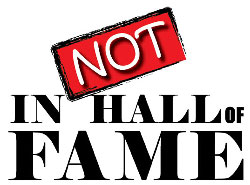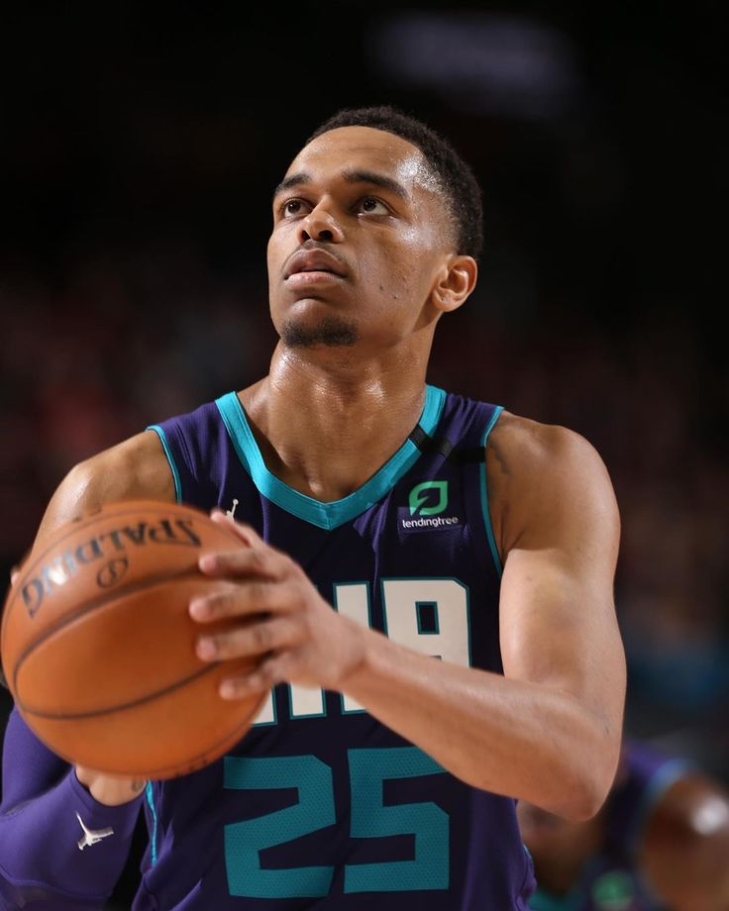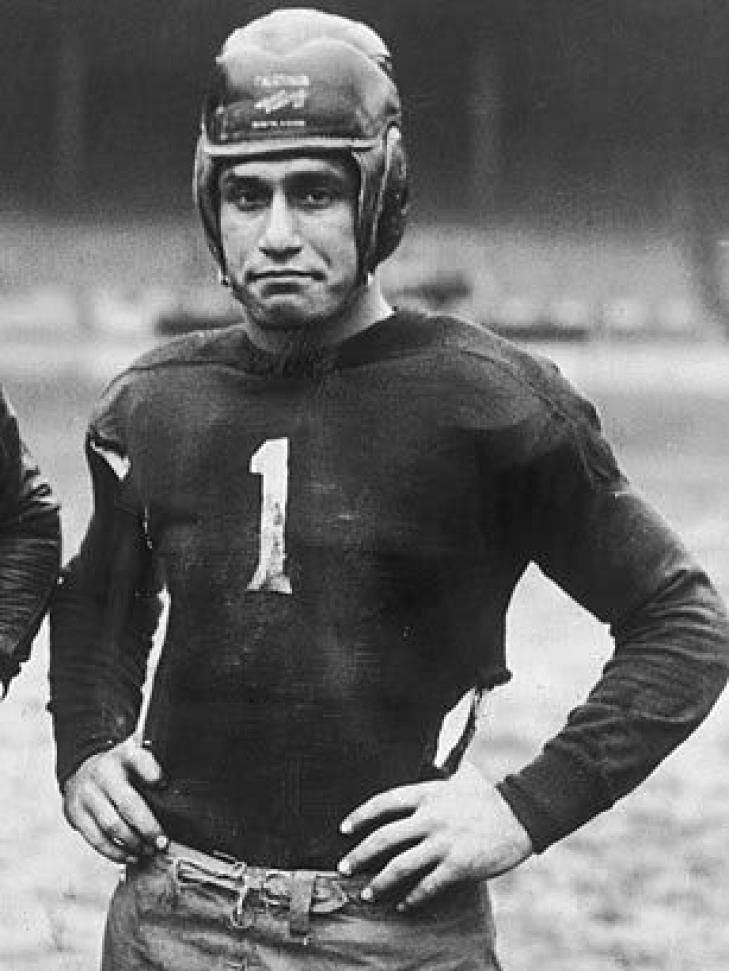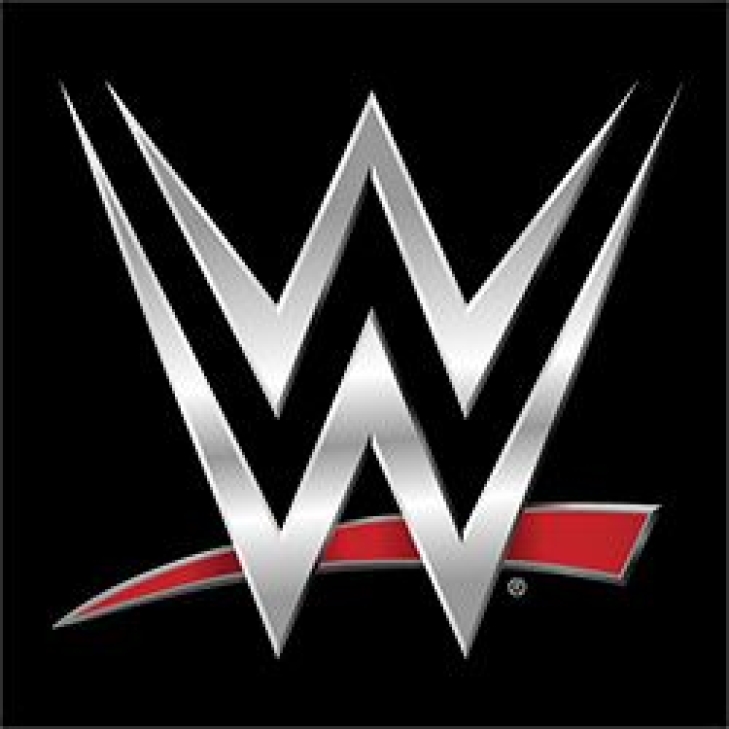
Committee Chairman
40. P.J. Washington
Taken with the 12th Overall Pick in 2019, P.J. Washington ventured east from the University of Kentucky to the Charlotte Hornets, the team where he still plies his trade for.
Washington was a Second Team All-Rookie at Power Forward, averaging 12.2 Points per Game, but he did not show much improvement in his sophomore year, with only moderate statistical gains. Washington lost his permanent starting job in 2021-22, but reclaimed the starter’s role, and had a career-high 15.7 PPG.
In 2023-24, Washington was traded during the season to Dallas (is that farther away from Brittany Renner?), and P.J. would have an overall 13.0 PPG over 304 Games.
41. Mason Plumlee
Mason Plumlee can be a punchline in some circles, but that should not be the case, as his play at Center has always been solid, though not star-making.
You don’t have to be a star to make it in the NBA, and Plumlee was already an eight-year veteran before he was traded to Charlotte, his fifth NBA team. A Hornet for 129 Games, Plumlee started them all, averaging 9 Points and 8.6 Rebounds per Game.
Charlotte traded Plumlee to the Los Angeles Clippers for their playoff run in 2023.
The Pro Football Hall of Fame Revisited Project: 1950 PRELIMINARY VOTE
1950 PRELIMINARY RESULTS:
Thank you for all of you who have participated in the Pro Football Hall of Fame Revisited Project, and if you are unaware of what that is, simply, we acted as if the PFHOF had their first class in January of 1946?
We have completed the first two years, where a Preliminary, Semi-Final and Final vote for the 1946 Class, which inducted two full classes
For “1950” a Preliminary Vote with 130 players whose playing career ended by 1943. We are also following the structure in that players have 20 years of eligibility, and if they do not make it into the Hall, they are relegated to the Senior Pool.
Each voter was asked to select 25 names from the preliminary list, with the top 25 vote getters named as Semi-Finalists.
A week later, the voters will be asked to pick 15 names from the 25 Semi-Finalists, and next after, they will pick five from the remaining 15. We will continue this process weekly until we catch up to the current year.
30 Votes took place
This is for the “Modern Era”
Bold indicates they advanced to the Semi-Finals:
|
Player |
Year of Eligibility |
Vote Total |
|
Ray Flaherty E-DE |
10 |
28 |
|
Mike Michalske G-T-LB-BB |
8 |
27 |
|
Clark Hinkle FB-LB-HB-DB |
4 |
27 |
|
Cliff Battles TB-FB-WB-DB |
8 |
26 |
|
Jimmy Conzelman HB-TB-BB-E |
16 |
25 |
|
Swede Youngstrom G-T-E-C |
18 |
25 |
|
Joe Guyon WB-TB-BB-FB |
18 |
24 |
|
Dutch Sternaman HB-QB-FB |
18 |
24 |
|
Verne Llewellen B |
13 |
24 |
|
Red Badgro E-DE |
9 |
24 |
|
Walt Kiesling G-T |
7 |
24 |
|
Steve Owen T-G |
12 |
23 |
|
Ox Emerson G-C |
6 |
23 |
|
Beattie Feathers HB-WB |
5 |
22 |
|
Turk Edwards T |
5 |
21 |
|
Cecil Isbell TB-HB |
3 |
20 |
|
George Musso G-T |
1 |
20 |
|
Hunk Anderson G-C |
20 |
19 |
|
Tuffy Leemans FB-TB-DB-QB |
2 |
17 |
|
Bill Hewitt E-DE |
2 |
15 |
|
Cub Buck T |
20 |
14 |
|
Tony Latone B |
15 |
9 |
|
Whizzer White TB-HB |
4 |
9 |
|
Pete Stinchcomb HB |
19 |
8 |
|
Doc Alexander C-T-G-E |
18 |
8 |
|
Al Nesser G-E-C |
14 |
7 |
|
George Christensen T-G |
7 |
7 |
|
Rip King B |
20 |
6 |
|
Lou Smyth B |
19 |
6 |
|
Gus Sonnenberg T-FB-TB |
15 |
6 |
|
Joey Sternaman QB-BB |
15 |
6 |
|
Joe Kopcha G |
9 |
6 |
|
Ben Jones FB-BB-WB |
17 |
5 |
|
Duke Osborne G-C |
16 |
5 |
|
Doc Elliott B |
14 |
5 |
|
Glenn Presnell T-B |
9 |
5 |
|
Bob Koehler FB |
19 |
4 |
|
Dinger Doane FB |
18 |
4 |
|
Tex Grigg B |
18 |
4 |
|
Jim McMillen G |
17 |
4 |
|
Wildcat Wilson TB |
16 |
4 |
|
Two-Bits Honan B |
15 |
4 |
|
Jug Earp C-T-G |
13 |
4 |
|
Russ Hathaway T-G |
18 |
3 |
|
Fred Gillies T |
17 |
3 |
|
Herb Stein C-G |
17 |
3 |
|
Tillie Voss E-T |
16 |
3 |
|
Red Dunn BB-TB |
14 |
3 |
|
Joe Lillard HB |
12 |
3 |
|
Nate Barragar C-G |
10 |
3 |
|
Luke Johnsos E |
9 |
3 |
|
Gaynell Tinsley E |
5 |
3 |
|
Ray Nolting HB |
2 |
3 |
|
Willis Brennan G-T |
18 |
2 |
|
Tex Hamer B |
18 |
2 |
|
Bub Weller T-E |
17 |
2 |
|
Bull Behman T-E |
14 |
2 |
|
Rudy Comstrock G-T |
12 |
2 |
|
Chuck Kassel E |
12 |
2 |
|
Tom Nash |
11 |
2 |
|
Father Lumpkin BB |
8 |
2 |
|
Swede Hanson B |
7 |
2 |
|
Ace Gutkowski FB-TB |
6 |
2 |
|
Ozzie Simmons HB |
6 |
2 |
|
George Svendesn C |
4 |
2 |
|
Clyde Smith C |
17 |
1 |
|
Duke Hanny E-T-G-FB |
15 |
1 |
|
Curly Oden BB |
13 |
1 |
|
Jack Spellman T-B |
13 |
1 |
|
Ray Kemp T |
12 |
1 |
|
Hap Moran B |
12 |
1 |
|
Dick Stahlman T-G |
12 |
1 |
|
Doug Wycoff B |
11 |
1 |
|
George Kenneally E |
10 |
1 |
|
Zuck Carlson G-T-C-LB |
9 |
1 |
|
Bill Morgan T |
9 |
1 |
|
Bill Owen T-G |
9 |
1 |
|
Stumpy Thomason WB-TB-BB-HB |
9 |
1 |
|
Keith Molesworth HB-QB |
8 |
1 |
|
Carl Brumbaugh B |
7 |
1 |
|
Potsy Jones G |
6 |
1 |
|
Ralph Kerchaval WB |
5 |
1 |
|
Jack Manders |
5 |
1 |
|
Eggs Manske E |
5 |
1 |
|
Bernie Masterson QB |
5 |
1 |
|
Jim Barber T |
4 |
1 |
|
Frank Bausch C |
4 |
1 |
|
Tony Blazine T |
4 |
1 |
|
Dick Farman G |
2 |
1 |
|
Al Blozis T |
1 |
1 |
|
Clyde Shugart G |
1 |
1 |
|
Hec Garvey G-E-T-C |
14 |
0 |
|
Jim Laird B-G-T |
14 |
0 |
|
Dick O'Donnell E |
14 |
0 |
|
Frank Racis G-T-E |
13 |
0 |
|
Don Murry T-E-G |
13 |
0 |
|
Milt Rehnquist G-C-T |
13 |
0 |
|
Al Graham G |
12 |
0 |
|
Les Caywood G-T |
11 |
0 |
|
Butch Gibson G-T |
11 |
0 |
|
Jack McBride FB |
11 |
0 |
|
Bill Senn B |
11 |
0 |
|
Bo Molenda FB-HB-BB |
10 |
0 |
|
Bert Pearson |
9 |
0 |
|
Clare Randolph C |
9 |
0 |
|
Al Rose E |
9 |
0 |
|
Harry Ebding E |
8 |
0 |
|
Lon Evans G-T |
8 |
0 |
|
Len Grant T |
8 |
0 |
|
Buster Mitchell E-T |
8 |
0 |
|
Ernie Caddell WB-TB-BB-FB |
7 |
0 |
|
Bill Karr E |
7 |
0 |
|
Ookie Miller C-G-LB |
7 |
0 |
|
Joe Zeller G-E |
7 |
0 |
|
Bree Cuppoletti G |
6 |
0 |
|
Kink Richards B |
6 |
0 |
|
Bill Smith E |
6 |
0 |
|
Ernie Smith T |
6 |
0 |
|
Johnny Dell Isola G |
5 |
0 |
|
Milt Gantenbein E |
5 |
0 |
|
Jack Johnson T |
5 |
0 |
|
Ed Danowski B |
4 |
0 |
|
Johnny Drake B |
4 |
0 |
|
Armand Niccolai T-G |
3 |
0 |
|
Lloyd Cardwell WR-DB-FB |
3 |
0 |
|
Bull Karcis FB-BB-HB |
2 |
0 |
|
Steve Slivinski G-LB |
2 |
0 |
This is for the “Senior Era”
*Bold indicates they advanced to the Finals:
|
Blondy Wallace |
5 |
20 |
|
Gull Falcon |
5 |
17 |
|
Henry McDonald |
5 |
17 |
|
Sol Butler |
5 |
14 |
|
Steamer Horning |
2 |
13 |
|
Herman Kerchoff |
5 |
12 |
|
Harry Robb |
2 |
12 |
|
Bob Shiring |
5 |
12 |
|
Tam Rose |
5 |
2 |
This is for the Coaches/Contributors
*Bold indicates they advanced to the Finals:
|
Bert Bell |
1 |
26 |
|
Ralph Hay |
1 |
23 |
|
Joseph Carr |
1 |
21 |
|
Jimmy Conzelman |
1 |
18 |
|
Charles Bidwell |
1 |
16 |
|
Elmer Layden |
1 |
8 |
|
Art Rooney |
1 |
6 |
|
LeRoy Andrews |
1 |
3 |
|
Carl Strock |
1 |
3 |
|
George Clark |
1 |
2 |
|
Tommy Hughitt |
1 |
2 |
|
Christopher O’Brien |
1 |
2 |
|
Dick Rauch |
1 |
2 |
|
Frank Nied |
1 |
1 |
|
Cooney Checkeye |
1 |
0 |
Next Saturday, we will be posting the results of the 1949 Finalists of the Pro Football Hall of Fame Revisited Project.
Thank you to all who contributed, and if you want to be a part of this project, please let us know!
WWE's Secret Weapon: Testosterone Boosters for Peak Performance
World Wrestling Entertainment (WWE) is globally renowned for showcasing athletes with seemingly superhuman strength, stamina, and physique. One crucial, yet often underplayed, element fueling these extraordinary performances is testosterone boosters.
These compounds not only provide the necessary vigour and energy but also aid in faster recovery and muscle growth, making them indispensable to the arduous routines of WWE superstars.
Furthermore, understanding the nuanced application and effects of these boosters is pivotal for both the industry insiders and the enthusiastic audience who avidly follow the sport.
Testosterone Boosters Explained
Essential Benefits
Testosterone boosters are supplements designed to increase testosterone levels in the blood. Elevated testosterone offers various advantages, such as enhanced muscle mass development, increased strength and endurance, improved recovery rates post-exercise, and sharpened focus and concentration.
Moreover, they play a significant role in maintaining bone density and red blood cell production, crucial factors contributing to an athlete’s overall health and vitality.
Natural Versus Synthetic
There's a distinction between natural and synthetic testosterone boosters. Many athletes and professionals often gravitate towards the best testosterone boosters, which are a blend of both natural and synthetic ingredients. Natural boosters, derived from herbs and dietary elements, tend to have milder effects with lower risk profiles.
Ingredients like fenugreek, ginger, and ashwagandha are prominent in this category. In contrast, synthetic boosters are stronger and faster-acting but might introduce more severe side effects, necessitating careful administration and monitoring.
Understanding this difference is imperative for athletes, as it enables them to make informed decisions about which type of booster best aligns with their health profiles and performance goals.
WWE Superstars and Testosterone
Performance Enhancement
For WWE superstars, presenting an optimal physical appearance while performing high-intensity moves is paramount. Testosterone boosters assist in sculpting a lean, muscular physique, rendering the athletes capable of executing strenuous routines effortlessly.
Elevated testosterone levels also underpin increased aggression and competitive drive, crucial traits for captivating performances inside the ring. Additionally, with the audience's expectations continually escalating, these boosters are invaluable in helping wrestlers meet and surpass these anticipatory standards with each performance.
Recovery and Longevity
Athletes in the WWE engage in rigorous schedules, with frequent travel and limited downtime. Testosterone boosters play a vital role in hastening recovery after strenuous matches, reducing fatigue, and mitigating the risk of injury.
These supplements also contribute to the athletes’ career longevity by maintaining peak physical condition and mitigating age-related testosterone decline. The wear and tear wrestlers experience are significant, making the recuperative properties of testosterone boosters an essential aspect of their dietary and health regimen.
Administering Testosterone Boosters
Safe Usage Guidelines
WWE athletes adhere to stringent guidelines to ensure safe and responsible usage of testosterone boosters. They undergo regular medical assessments to monitor testosterone levels, liver function, and overall health.
Medical professionals guide the administration, adjusting dosages to avoid overdose or unhealthy dependence, thereby safeguarding the athletes' wellbeing. This meticulous approach to testosterone supplementation ensures not only the athletes' peak performance but also their long-term health and welfare in a highly demanding profession.
Ethical Considerations
Though testosterone boosters offer undeniable benefits, ethical considerations around their use cannot be overlooked. WWE implements strict policies and testing procedures to prevent abuse of these supplements, maintaining a fair and level playing field.
These efforts also serve to uphold the integrity of the sport and protect the athletes from potential long-term health risks associated with supplement misuse. Engaging in open dialogues about these ethical considerations further reinforces the commitment to fairness and health within the WWE community and its wide-reaching influence.
Navigating Side Effects of Testosterone Boosters
Potential Risks Involved
Using testosterone boosters isn’t without its risks, and it’s vital for WWE superstars and their medical teams to acknowledge and navigate these potential side effects meticulously.
These supplements can sometimes lead to acne, sleep apnea, enlarged breasts in men, and mood fluctuations. Additionally, there's the risk of heart diseases and mental health issues, especially when the boosters are misused or overused without medical supervision. Awareness and understanding of these potential side effects are crucial for the athletes to use testosterone boosters responsibly and sustainably.
Proactive Management Strategies
For optimal health, WWE athletes and their health advisors employ proactive strategies to mitigate and manage the side effects of testosterone boosters. Individualized plans, taking into account each wrestler’s health profile, performance needs, and career goals, are formulated.
Regular screenings and health check-ups are conducted to monitor the athletes’ response to testosterone supplementation and adjust dosages accordingly. Lifestyle modifications, including dietary changes and stress management techniques, are often recommended to counterbalance the side effects, ensuring that the athletes remain in prime condition for both performances and life outside the ring.
Conclusion
Testosterone boosters are an integral component of a WWE superstar’s toolkit for peak performance, providing the necessary physiological support for both in-ring actions and recovery.
Administered judiciously and ethically, these supplements enable the athletes to entertain millions worldwide with their remarkable strength, resilience, and charisma while safeguarding their health and careers.
For enthusiasts and aspiring wrestlers, understanding the role and responsible use of testosterone boosters is crucial for navigating a successful and healthy journey in the exhilarating world of WWE. The insightful exploration of testosterone boosters’ nuanced applications highlights their indispensable role in crafting the awe-inspiring spectacles that WWE admirers cherish and celebrate.




